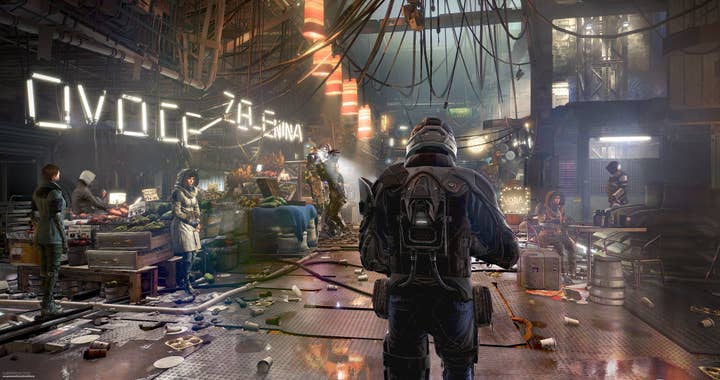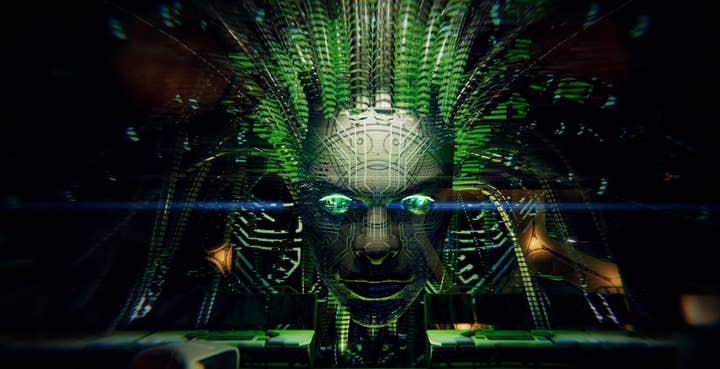Warren Spector: "If immersive sims disappear, I disappear"
System Shock developer explains why the struggles of Dishonored and Deus Ex won't deter him from his chosen genre
Immersive sims is a genre all about choice, but fans are rapidly running out of them.
Deus Ex, Thief and Dishonored are all on hiatus following the disappointing performance of their latest outings, and the poor reception for Underworld Ascendant (the spiritual successor to Ultima Underworld, deemed by many to be the first immersive sim) makes a follow-up unlikely.
It would be easy to argue the genre is dying, at least at the level of major publishers, and the scope of such projects makes them difficult for indies to deliver. At Reboot Develop, we asked Warren Spector -- known for immersive sims, including Deus Ex, Thief and System Shock -- why the segment is struggling.

"The reality is we ask people to work," he told GamesIndustry.biz. "It's an interesting thing. The immersive simulation is not the kind of game where if you keep moving forward, like a shark, you'll eventually win. It's not the kind of genre where you just solve a puzzle the designer created for you, or kill everything that moves and you win. It's a genre where you have to decide what to do, you have to choose how to interact with the world. That is work, it requires brain power. So I suspect that's part of it."
But surely that's integral to the genre's appeal? These games are all about choice. If a player wants to treat Deus Ex, for example, as a shooter and go in all guns blazing, they can. Alternatively, they can approach it like a stealth game, or concentrate on hacking and other non-combat abilities to find new avenues forward. Essentially, it's like an RPG but without number-crunching or the grind.
"That's exactly right," said Spector. "The odd thing is I always thought, and still think, that's the most mainstream idea you could possibly think of. If I play a shooter or a stealth game and I'm not good enough, all I can do is stop playing. Same if I'm playing a puzzle game and I'm not clever enough. In the immersive simulation, if the combat or stealth is too hard you try something else."
Spector suggested that part of the genre's decline might be because elements, even the entire ethos, can be found in other games. While he's careful not to claim direct influence, he cited Zelda: Breath of the Wild as a game with, "some of the tenets of immersive simulation." Similarly, the Far Cry series has been built around enabling players to adapt their playstyle how they see fit.
"It's not kill everything that moves and you win. You have to decide what to do. That is work, it requires brain power"
While the System Shock 3 director can't speak for other companies' games, he does know Underworld Ascendant has "done well enough to get our next game funded" -- although he said he doesn't know the exact sales figure.
"My business partner handles all this stuff because I just want to make games," he said. "I do not want to think about it. I spent a few years with Disney thinking about the studio as much as I was thinking about the game, and I don't want to do that anymore. I suspect you're right, that sales weren't quite what we hoped for, but I really don't know."
Regardless of whether his company's latest release sold well enough to fund another, it's impossible to ignore the number of companies struggling to sell this type of game in sufficient quantities. Given how risk-averse this industry can be, particularly at the top, does this mean the end is nigh for immersive sims?
"It's not going to disappear," said Spector. "Well, if it does, I'm going to disappear. By choice.
"One of the ways to address this on System Shock 3 and at OtherSide in general is we're trying to keep our budgets in line with our expected sales. Given our budget, we don't have to sell 100 million copies, we don't have to make $1 billion for a major publisher to succeed and to make money. Our budgets now are by choice more modest, and that means we don't have to sell as many copies. We have a dedicated audience, people who love these games. We have people who love making them. So all we have to do is adjust our thinking to reach that audience."

Under the circumstances, it would be tempting for a developer to pivot, or at least adapt its design to somehow address whatever it is about other titles in this space that disappoints players. But Spector insisted the woes experienced by so many similar franchises have not had an impact on his vision for his current project.
"It probably should have affected the way I think about System Shock 3, but honestly it hasn't," he said. I've been saying for years I make the games I want to make, the way I want to make them. If you don't want that, let's part ways now and stay friends. I've got a picture in my head [of System Shock 3], I've got a team that buys into that who are going to make that picture a reality, and we'll let the chips fall where they may."
"If I play a shooter or a stealth game and I'm not good enough, all I can do is stop playing. In the immersive simulation, if the combat or stealth is too hard you try something else"
The real challenge with System Shock 3 is living up to the legacy of its forebears. It's been 20 years since System Shock 2, 25 since the original, and striking the balance between staying true to the old games but adopting the advancements of newer ones is "terrifying," according to Spector.
"We're not even competing with System Shock and System Shock 2; we're competing with people's memories of them. And their memories are not of terrible-looking 2D animation, blocky graphics, simple levels.
He continued: "But it's interesting and strange to have the opportunity to go back and give Shodan some sensible motivation. In the earlier games it was like, 'Why did I do it? Because I'm mad of course.' It's a great character; people love Shodan and she's a terrific villain, but that's not the most sophisticated motivation you can come up with. So the opportunity to explain who she is, let her become something is kinda cool.
We're also going to bring back Citadel Station in some form -- was it entirely destroyed? If you go back to the original game, you can find the answer. There were some survivors of those early games, so being able to tell people what happened to those characters is fun.
"But the thing we always have to remember is that it's a balancing act. We have to make sure we reach beyond the core fans. The original System Shock and System Shock 2 were re-released in their original form with no changes about three years ago and sold over a million copies -- so we know there's an audience out there, but we need to reach beyond that. We're finding the balance between pleasing the existing fans and giving new fans something to grab onto without knowing all the lore."

System Shock 3 and Underworld Ascendant have given Spector the chance to revisit and improve on some of his earliest creations, although the rights to his other past works now lie in the hands of other publishers. The veteran has in the past described the original Deus Ex as his dream project, yet while you might expect he would be upset to no longer have control over it, he instead offered praise for Square Enix's handling of the franchise so far.
"Not many people get the opportunity to work on something that's bigger than they are, so it's kinda like, 'Oh look, my baby is growing up.' And the people who worked on Deus Ex: Human Revolution respected the franchise, they got what we were trying to do.
"It was incredibly risky. I think they started with no codebase, they had never done a Deus Ex game. It was crazy, but they pulled it off. There were things I would have done differently, and I told them -- and they ignored me, which is probably the right thing to do because it's their game now. By the end of the game, I had had a Deus Ex experience because it's all good."
As mentioned, Spector remains confident that immersive sims won't disappear. Instead, he believes developers' ability to create more complex simulations of things like physics and other elements of the world will only improve the scope of them. Players will be able to "apply actual logic" to a world and the decisions they make, using these simulated systems as a tool to solve the in-game problems they face.
"Also, it's probably time for us to go multiplayer," he concluded. "I think we have to see that. We've been talking about it for years, nobody's done it right."
The history of the immersive sim is one of single-player campaigns, so how on Earth would a multiplayer version work?
"If I told you, I'd have to kill you," Spector said. Or perhaps use a stealth takedown, or hack this article -- there's always another choice.
GamesIndustry.biz is a media partner for Reboot Develop and attended the event with the assistance of the organisers

